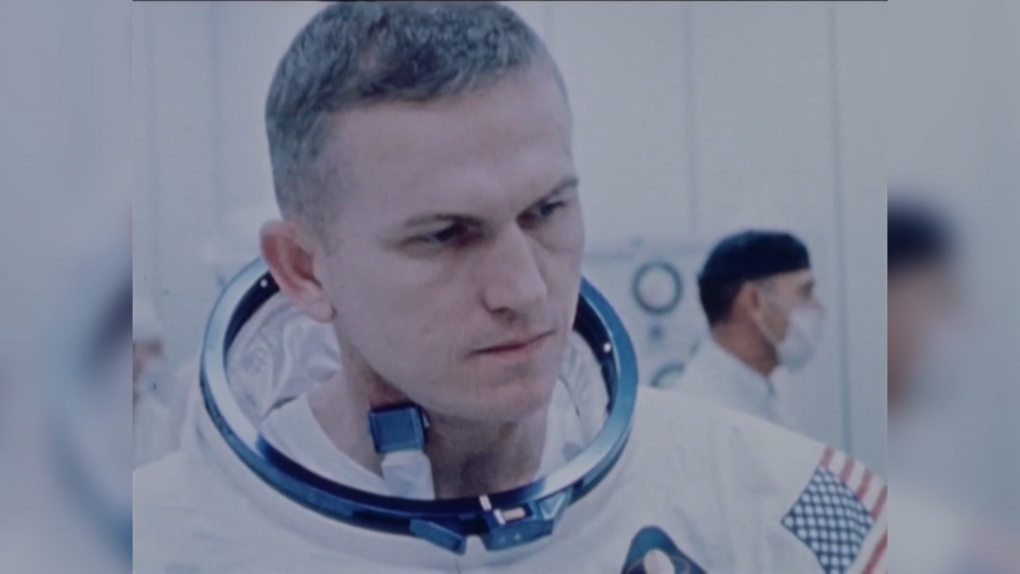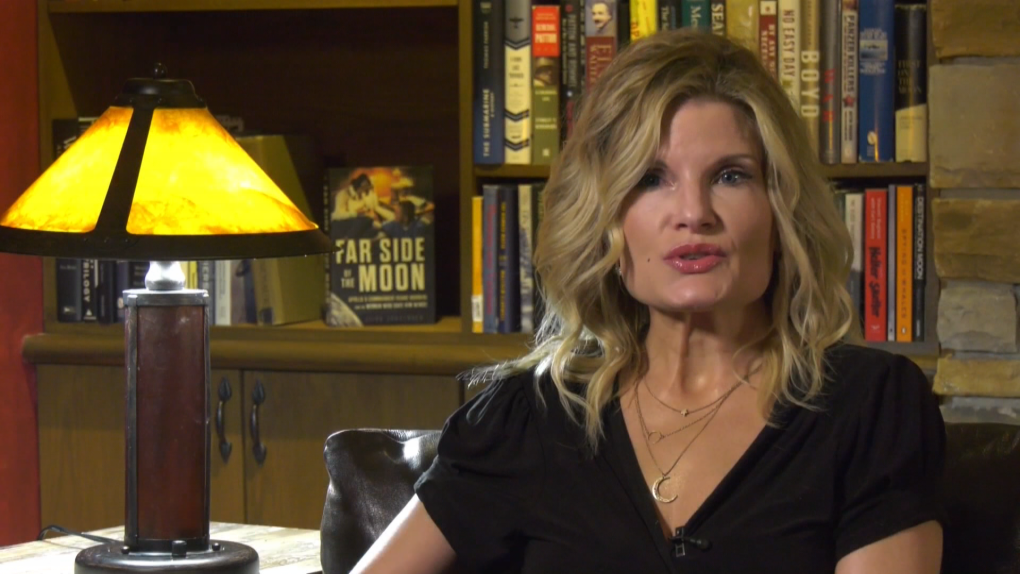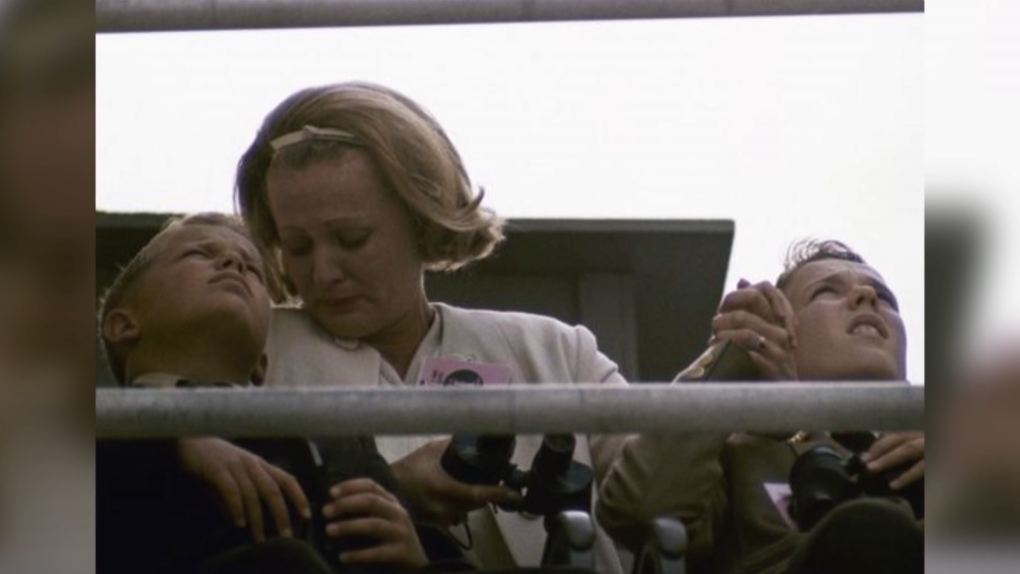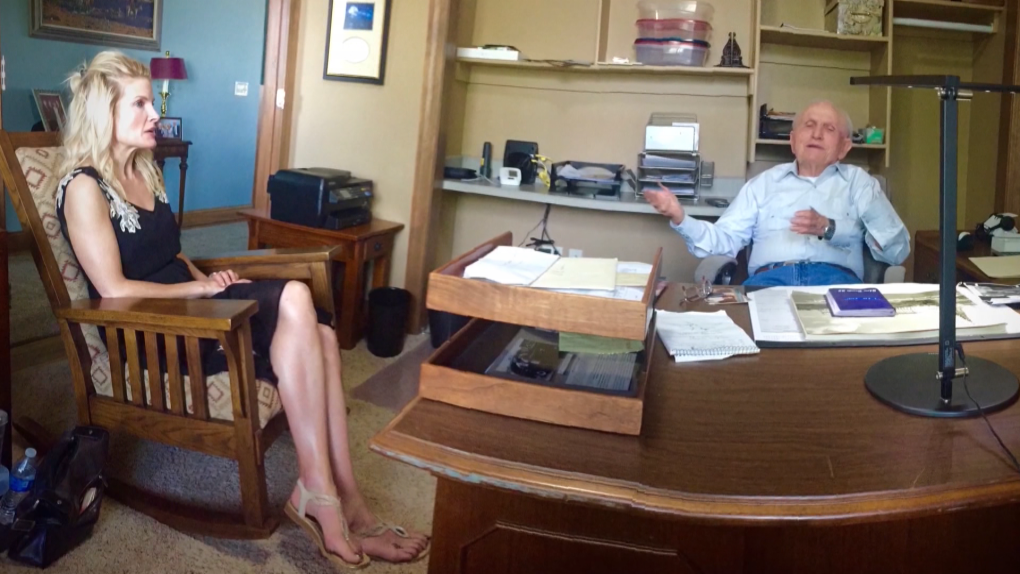Book about 1960s space race gives new meaning to loving someone to the moon and back
Earth is the sideline and also the main setting in a new book that explores the risk taken by astronauts and their families during the 1960s space race.
Far Side of the Moon, by Edmonton author Liisa Jorgensen, retells the story of the first men to see the moon's other face during the Apollo 8 mission.
Commander Frank Borman and pilots William Anders and James Lovell Jr. made history during the December 1968 space trip, which was considered an overall success.
 Frank Borman appears in this photo from 1968. (Source: NASA)
Frank Borman appears in this photo from 1968. (Source: NASA)
Frank Borman appears in this photo from 1968. (Source: NASA)
But there had been no guarantee of that when the men were still on Earth, or even that they'd return.
In her first book, based on a series of interviews with Borman about his relationship with his wife, Susan Borman, Jorgensen explores the toll of NASA's goals on a woman watching her husband risk his life in the name of science.
"In my research, (I) started realizing that the wives had not really been represented," Jorgensen said.
"I didn't want them to ever come off as being victims in any way. They very much believed in what their husbands were trying to accomplish and so they supported them in any way they could, even though there was a very good chance they would end up widows."
 Far Side of the Moon, by Edmonton author Liisa Jorgensen, retells the story of the first men to see the moon's other face during the Apollo 8 mission and the impact their mission had on their families.
Far Side of the Moon, by Edmonton author Liisa Jorgensen, retells the story of the first men to see the moon's other face during the Apollo 8 mission and the impact their mission had on their families.
Far Side of the Moon, by Edmonton author Liisa Jorgensen, retells the story of the first men to see the moon's other face during the Apollo 8 mission and the impact their mission had on their families.
Jorgensen began interviewing Borman, now 93, at his Montana home in 2019.
She says the conversations provided an intimate glimpse into the years surrounding 1968, when pressure and attention on Borman's mission were highest.
An earlier Apollo catastrophe killed three astronauts. Borman was tasked with the redesign to carry men to the moon, also effectively the space program's last lifeline. There would have been no Apollo 11 without Apollo 8.
"So you can imagine he just wasn't around," Jorgensen told CTV News Edmonton.
The astronauts' wives were overnight celebrities, expected to dress a certain way and often followed by reporters.
 Susan Borman is shown in this photo from 1965. Source: NASA
Susan Borman is shown in this photo from 1965. Source: NASA
Susan Borman is shown in this photo from 1965. Source: NASA
"That amount of stress at some point comes up, and it did later."
The writer said Borman was "very open and honest about everything, the ways that he felt he contributed to her suffering."
"He wasn't trying to gloss anything over at this point in his life."
In fact, Jorgensen said the astronaut didn't even hesitate when she proposed the book -- she believes to give his late wife a voice.
 Far Side of the Moon, by Edmonton author Liisa Jorgensen, retells the story of the first men to see the moon's other face during the Apollo 8 mission and the impact their mission had on their families. She is pictured here, left, with Apollo 8 commander Frank Borman. The book is based on interviews with Borman about his eight-decades-long relationship with Susan Borman.
Far Side of the Moon, by Edmonton author Liisa Jorgensen, retells the story of the first men to see the moon's other face during the Apollo 8 mission and the impact their mission had on their families. She is pictured here, left, with Apollo 8 commander Frank Borman. The book is based on interviews with Borman about his eight-decades-long relationship with Susan Borman.
The Bormans' relationship spanned eight decades. Susan died with Alzheimer's in September 2021. Jorgensen met the non-verbal woman once; she says Susan smiled as they held hands.
"I think she would say thank you. I know I would."
The book, subtitled Apollo 8 Commander Frank Borman and the Woman Who Gave Him Wings, goes on sale in December.
Jorgensen and her husband's company, Myth Merchant Films, also has the rights to develop a movie and has begun work on a script.
CTVNews.ca Top Stories

opinion Tom Mulcair: Prime Minister Justin Trudeau's train wreck of a final act
In his latest column for CTVNews.ca, former NDP leader and political analyst Tom Mulcair puts a spotlight on the 'spectacular failure' of Prime Minister Justin Trudeau's final act on the political stage.
B.C. mayor gets calls from across Canada about 'crazy' plan to recruit doctors
A British Columbia community's "out-of-the-box" plan to ease its family doctor shortage by hiring physicians as city employees is sparking interest from across Canada, says Colwood Mayor Doug Kobayashi.
'There’s no support': Domestic abuse survivor shares difficulties leaving her relationship
An Edmonton woman who tried to flee an abusive relationship ended up back where she started in part due to a lack of shelter space.
opinion King Charles' Christmas: Who's in and who's out this year?
Christmas 2024 is set to be a Christmas like no other for the Royal Family, says royal commentator Afua Hagan. King Charles III has initiated the most important and significant transformation of royal Christmas celebrations in decades.
Baseball Hall of Famer Rickey Henderson dead at 65, reports say
Rickey Henderson, a Baseball Hall of Famer and Major League Baseball’s all-time stolen bases leader, is dead at 65, according to multiple reports.
Arizona third-grader saves choking friend
An Arizona third-grader is being recognized by his local fire department after saving a friend from choking.
Germans mourn the 5 killed and 200 injured in the apparent attack on a Christmas market
Germans on Saturday mourned the victims of an apparent attack in which authorities say a doctor drove into a busy outdoor Christmas market, killing five people, injuring 200 others and shaking the public’s sense of security at what would otherwise be a time of joy.
Blake Lively accuses 'It Ends With Us' director Justin Baldoni of harassment and smear campaign
Blake Lively has accused her 'It Ends With Us' director and co-star Justin Baldoni of sexual harassment on the set of the movie and a subsequent effort to “destroy' her reputation in a legal complaint.
Oysters distributed in B.C., Alberta, Ontario recalled for norovirus contamination
The Canadian Food Inspection Agency has issued a recall due to possible norovirus contamination of certain oysters distributed in British Columbia, Alberta and Ontario.


































